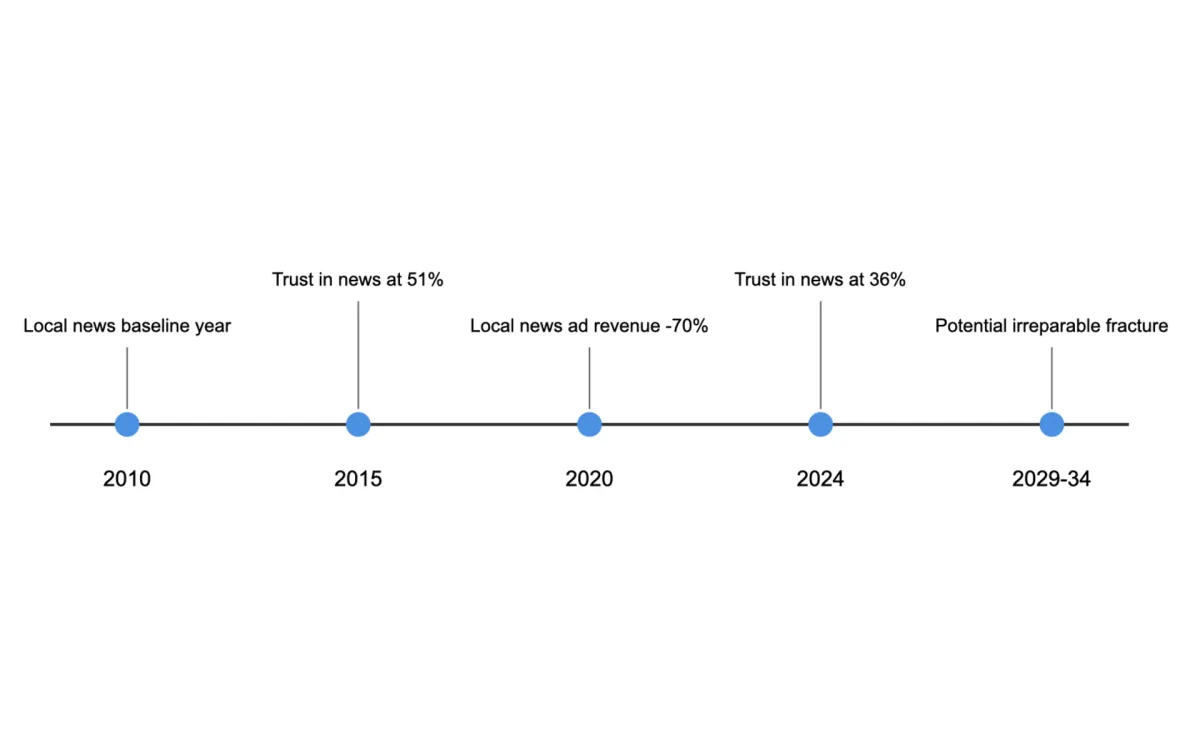
A comprehensive report released by the House of Lords Communications and Digital Committee last month raises significant concerns about the future of UK news media, warning of potential irreparable fractures in the information ecosystem within the next decade.
According to the report published on November 25, 2024, trust in news has declined by 15 percentage points since 2015, while public interest in news content has experienced a more dramatic 32 percent decrease during the same period. These shifts in public engagement come as the sector grapples with technological disruption and financial pressures.
Local journalism faces particularly severe challenges. The report highlights that local news organizations lost 70 percent of their advertising income between 2010 and 2020, with no signs of recovery for these revenue streams. The financial strain has led to what the committee terms "news deserts" - areas where residents have limited or no access to local news coverage.
The technological landscape presents both opportunities and challenges. The committee's investigation found that artificial intelligence technologies are fundamentally altering how people discover and consume news content. Large technology companies now possess "unprecedented influence over the information we see," with AI models capable of producing news summaries and addressing politically sensitive topics.
One of the most pressing concerns identified in the report is the emergence of what the committee describes as a "two-tier media environment." This division is characterized by a shrinking minority of well-informed news enthusiasts who have access to and can afford quality journalism, while a growing proportion of the population faces increasing difficulties accessing professionally produced news content.
The committee's findings resulted from extensive consultations with 51 expert witnesses and review of over 600 pages of written evidence. The investigation included visits to major technology companies and media organizations in San Francisco, including OpenAI, Apple, Google, Meta, and various news outlets.
Financial sustainability remains a critical challenge. According to the report, commercial radio presents a relatively positive picture, with advertising revenues in 2022 reaching "the highest ever." However, traditional media outlets face continuing decline. Print newspaper circulation "has gone from 8 million copies per day to well under 3 million copies per day," the report notes.
The committee expressed particular concern about the use of news content for AI training. The report states that while AI firms need significant amounts of data to train their models, many copyright holders argue that legal exceptions do not apply, and tech firms should seek permission or provide compensation for using their data.
Regulatory oversight also requires updating. The committee found that Ofcom's media ownership and merger rules are "poorly suited" to the evolving environment. The regulator's current frameworks focus primarily on traditional print and broadcast outlets, potentially overlooking the growing influence of technology platforms in news distribution and creation.
Broadcasting faces its own set of challenges. The report reveals that complaints to Ofcom have increased by 600 percent since the launch of GB News and TalkTV. The committee noted ongoing debates about impartiality and the use of politicians as presenters, with GB News found in breach of the Broadcasting Code on five occasions regarding this issue.
The BBC's role remains crucial but complicated. The corporation faces "significant financial challenges," according to the report, with news programmes and jobs being reduced or cut. The upcoming Charter Review in 2027 presents an opportunity to re-examine the BBC's future, including funding models and strategic priorities.
To address these challenges, the committee recommends several measures:
- Establishing a Future News catalyst scheme to help media organizations experiment with technology and transition to sustainable business models
- Implementing tax breaks for hiring local journalists
- Expanding the Local Democracy Reporting Service
- Updating legislation to align incentives between news providers and AI firms
- Strengthening regulatory oversight of technology platforms
The report emphasizes that any government intervention must maintain media independence while creating conditions that enable the sector to adapt to technological change. The committee warns that failure to address these challenges could result in the UK's news environment fracturing "irreparably along social, regional and economic lines within the next five to ten years."
The government is expected to respond to the committee's recommendations within two months of the report's publication.

